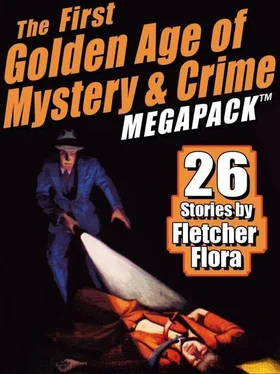The scream was not loud, not long, and there was no shadow and no sound by the time Lawler and I reached the porch. I was faster than he, running on longer legs, and he was a step behind me when I threw open the door to see Constance Markley hanging by the neck from the hands of her husband.
Interrupted in murder, he turned his face toward us in the precise instant that Lawler fired, and in another instant he was dead.
Constance Markley began to scream again.
She screamed and screamed and screamed.
I had a notion that the screams were two years old.
I took a week to get things cleared up. I stayed in Amity that week, and then I went home, and the day after I went home, I went up to the apartment of Faith Salem. I made a point of going when the sun was on the terrace. Maria let me in, and I crossed the acres of pile and tile and went out where Faith was. She was lying on her back on the bright soft pad with one forearm across her eyes to shade them from the light. She didn’t move the arm when I came out.
“Good afternoon, Mr. Hand,” she said.
“Good afternoon,” I said.
“Excuse me for not getting up. Will you please sit down?”
“It’s all right,” I said. “Thanks.”
I sat down in a wicker chair. It was very warm on the terrace in the sun, but the warmth was pleasant, and after a while I began to feel it in my bones. Faith Salem’s lean brown body remained motionless, except for the barely perceptible rise and fall of her breasts in breathing, and I suspected that her eyes were closed under her arm.
“So it was Graham after all,” she said.
“That’s what you suspected, wasn’t it?”
“In a way. I had a feeling, but it was a feeling that he had done something to Constance. I can’t understand why he killed this man.”
“Not because of the affair. He didn’t care about that.”
“Why, then?”
“Regis Lawler tried to blackmail him. It went back to something that happened several years ago. Graham Markley and Constance were driving back from the country. They’d been on a party, and Graham was drunk. He hit a woman on the highway and killed her and kept right on driving. It was a nasty business. Constance isn’t a strong person, nor even a very pleasant person, and she agreed with Graham that it was better to keep quiet about the incident. It’s easy for some people to rationalize that kind of attitude. Then, in due time, after the death of her child, she met Regis Lawler, and she wanted to do with Regis just what everyone actually assumed she had done. She wanted to run away from everything — her marriage, her guilt, everything associated with her child’s death, all the unhappiness that people like her seem doomed to accumulate.
“Apparently Regis let her believe that he might be willing to go along with this, but he had no money. Silas Lawler told me that Regis stole seventy-five grand from a wall safe at the restaurant, but it wasn’t so. It was only a lie Silas used to make their running away plausible. What really happened was that Constance told Regis about the woman’s death on the highway, and Regis tried the blackmail, although he actually had no intention, it seems, of going anywhere at all with Constance. The blackmail didn’t work. Graham Markley wasn’t the kind of weak character to submit. He went to Lawler’s apartment and killed him. When Constance went there later the same night and found his body, she knew immediately what had surely happened. Her own burden of guilt was too heavy to bear in addition to everything else, and so she escaped it by becoming someone else to whom none of this had ever happened. It was something that could only have happened under certain conditions to a certain kind of person. She became the one woman she had known that she completely admired and envied, and she went back to the place where she had, for a while, been happier than she had ever been before or since. She became you, and she went back to Amity. With a break or two and a couple of hunches, I got the idea that she might be there, and I went there to see if I could find her, and Graham Markley learned from you where I was going. He was terribly afraid of what Constance might know to tell if she was found, and it was imperative, as he saw it, to get rid of her for good and all. And so he followed me and found her and tried to kill her, but it didn’t turn out that way.”
“I’m sorry I told him,” she said. “It was a mistake.”
“Not for me,” I said. “It made me a smart guy instead of a corpse.”
“What do you mean?”
“Nothing,” I said. “It’s not important.”
The sun in the sky was nearing the tooled ridge of stone. I wished for a drink, but nobody brought one. Faith Salem’s breasts rose and fell, rose and fell. Her long brown legs stirred slightly in the sun.
“Did Constance tell all this?” she said.
“The part about the murder. Not the rest.”
“How strange it is. How strange simply to forget everything and become someone else.”
“Strange enough, but not incredible. It’s happened before. People have gone half around the world and lived undetected in new identities tor years.”
“Is she all right now?”
“She remembers who she is and everything that happened until she found the body of Regis Lawler in his apartment. She doesn’t remember anything that happened in the time of the fugue. That’s a long way from all right, I guess, but it’s as good as she can hope for.”
“Why become me? Why me of all people?”
There was honest wonderment in her voice. Looking at her, the lean brown length of her, I could have told her why, but I didn’t. I had a feeling that it was time to be going, and I stood up.
“I think I’d better leave now,” I said.
“Yes,” she said. “I think so.”
“I’ll send you a bill.”
“Of course. I’ll be here as long as the rent’s paid. That’s about three months.”
“Are you going to look at me before I leave?”
“No. I don’t think so. Do you mind letting yourself out?”
“I don’t mind.”
“Good-by, then, Mr. Hand. I wish you had a lot of money. It’s a shame you’re so poor.”
“Yes, it is,” I said. “It’s a crying shame.”
She never moved or looked at me, and I went away. The next day I sent her a bill, and two days after that I got a check. I saw her twice again, but not to speak to. Once she was coming out of a shop alone, and once she was going into a theater on the arm of a man. I learned later that she married a very rich brewer and went to live in Milwaukee.
Originally published in Alfred Hitchcock’s Mystery Magazine , March 1960.
It was a Thursday morning when Corey McDown called me. I hadn’t heard from Corey for a long time. Not directly. After he got to be a cop, we sort of drifted apart and lost contact with each other. I’m not exactly allergic to cops, you understand, but it usually turns out that we’re incompatible.
Corey was a bright guy, and he’d moved up fast in the force. He was pretty young for a lieutenant in Homicide.
“Hello, Mark,” he said. “Corey McDown here. Did I get you out of bed?”
“I don’t have to get out of bed to answer the phone,” I said. “How are you, Corey?”
“I’ve been worse,” he said, “and I’ve been better. I wonder if you’d do me a favor.”
“Do I owe you a favor?”
“Do this one for me, and I’ll owe you one.”
“You think I may need it?”
“You may, Mark. You never know.”
“True. There have been times before. What’s on your mind, Corey?”
“I hate long telephone conversations. Ask me over.”
Читать дальше












